Who is bigger: Liverpool or Manchester United? We asked our football experts - and they came down overwhelmingly on one side. Now have YOUR say
At Anfield this week they have been handing out league championship medals to ex-players who – because of old rules – weren’t deemed to have played enough games at the time.
It was quite a line up. Two of them – Terry McDermott and Alan Kennedy – have both scored goals in European Cup finals for Liverpool . Others – like David Fairclough and Jan Molby – are buried deep in the club’s folklore for different reasons.
Nevertheless, down the East Lancs Road (though it’s quicker to take the M62 these days) at Manchester United they would once have laughed at this. A faded football club handing to medals to doyens of the 1970s and 1980s. Is a storied past all that you have got?
It’s worth remembering that when Liverpool’s current owners FSG bought the club in 2010, Liverpool were in the bottom three of the Premier League , hadn’t been English champions for two decades and had an annual income of just half their great rivals.
Indeed, it was to take another ten years for the wheels to turn fully. Liverpool didn’t win their next and 20th league title until 2020. But turn they undoubtedly have. Nobody at Old Trafford is laughing now.
As the great titans of the north-west meet at Anfield on Sunday, with the world watching as usual, it is Liverpool’s levers and gears that continue to propel them forwards with United thrashing about seemingly without direction in their rear-view mirror. Now it is United clinging on to such intangibles as legacy and history.
Arch-rivals Liverpool and Manchester United meet in the Premier League at Anfield on Sunday
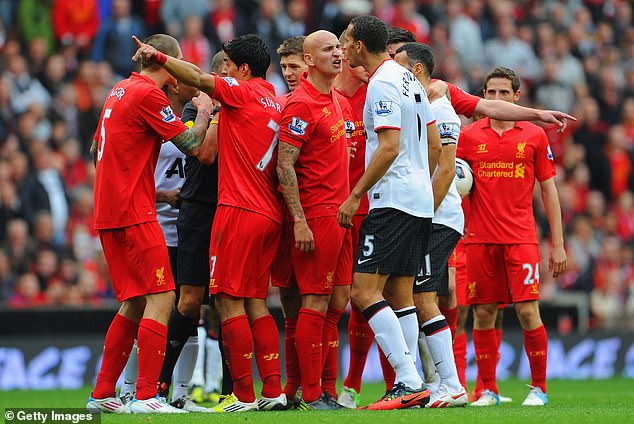
Liverpool have this week been making sure that former heroes like Terry McDermott (far right) are receiving league championship medals they are now rightfully owed
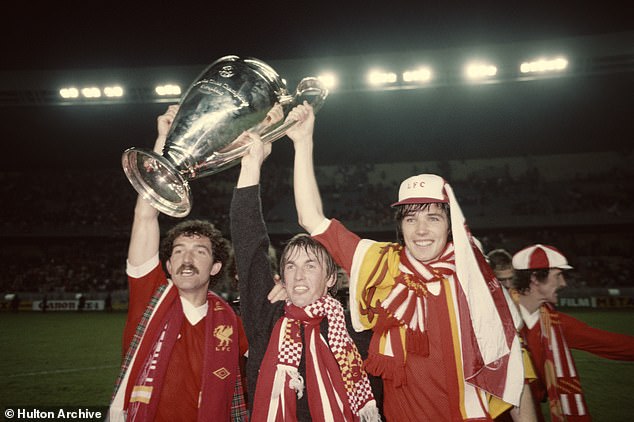
United might have once mocked the gesture, they are some way from their own glory days
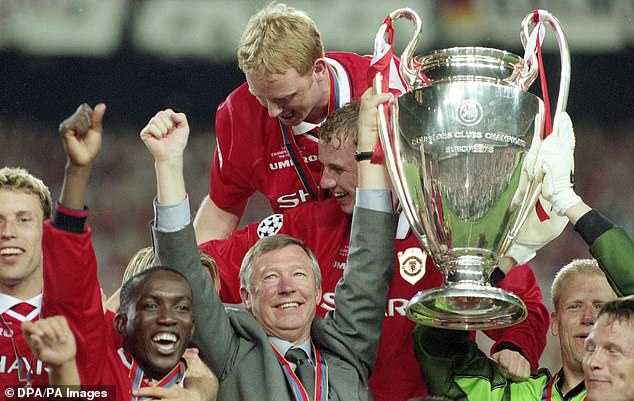
It says much that the fact Arne Slot’s Liverpool have just lost three straight games is viewed by some as a modern Anfield crisis. The bar of expectation is set high these days on Merseyside.
Meanwhile United’s issues and inconsistencies are so deep and engrained now, they journey west in hope more than expectation. Last season’s 2-2 draw was considered a platform for manager Ruben Amorim and, though it hasn’t turned out that way, it was a considerable improvement on embarrassments such as the one that came in the way of a 7-0 hiding in 2023.
That result was actually a bit freakish but the trends are telling. Indeed since United last won the Premier League under Sir Alex Ferguson in 2013, the cumulative points gap between the two clubs stands at 177 in Liverpool’s favour and some of those seasonal margins have been enormous.
Liverpool now have as many league titles – 20 – as United and almost as much money. Can they therefore lay claim to have finally overhauled United and stand as England’s biggest football club?
The good news for United is that it actually could have been much worse. In that 30-year period between Liverpool’s last Division One title success in 1990 and their first Premier League trophy lift in 2020, Ferguson’s United won the league an incredible 13 times. Liverpool, for all that they have emerged as one of Europe’s great sides once again, have only got their hands back on it twice during United’s fallow period.
That, largely, has been because of Pep Guardiola’s Manchester City. There is an argument that the side that Jurgen Klopp built in 2021-22 is Liverpool’s greatest ever. It amassed 92 points that season and lost only five times in 75 games in all competitions between March 2021 and May 2022. Yet it didn’t win the league, just as it didn’t when accumulating 97 points in 2019. City, City, always City. So as it stands today, Liverpool and United are tied on 20 league titles each.
In terms of total trophy count, it’s also incredibly close. Liverpool have won 47 major trophies compared to United’s 44. They have six European Cups to United’s three but then the team from Manchester has not relied on the League Cup to boost their total in quite such a way as Liverpool have. It really is that close to call.
The Reds won their 20th league title in 2024-25 as Arne Slot's side romped home to triumph
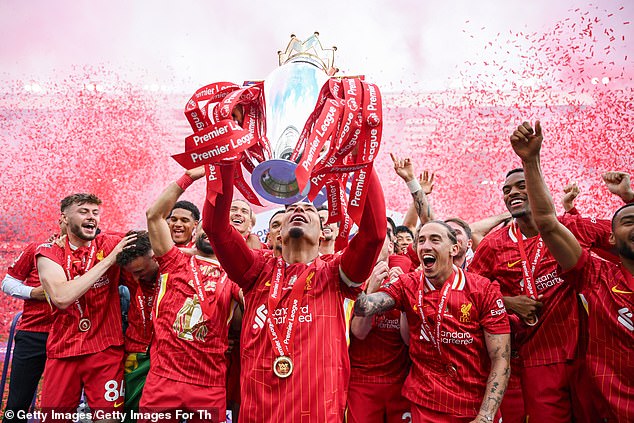
One of the great Liverpool boot room stalwarts – and a manager who tried and failed to reverse Liverpool’s decline in the 1990s – was Roy Evans.
He recalls the challenges of trying to rediscover a lost identity. ‘It takes you a long time to get to the top and 30 seconds to come back down again,’ Evans told the Daily Mail.
‘We found that out the painful way and more recently it’s been United’s turn. The longer it goes, the harder it gets.'
Molby, a world class midfielder in that 1990 team, agrees. ‘United just got ahead us on and off the field in the 1990s and we couldn’t get back to them,’ said the great Dane, who is now an analyst for TV2 in his home country.
At United – as things got tough under a succession of managers post-Ferguson – they saw hope in the expectation that the Klopp bubble would burst at some point.
‘It’s an era of Guardiola and Klopp,’ former United executive vice-chairman Ed Woodward told a friend as he stepped aside in 2022. ‘When that’s over it may be our turn again.’
More than a year into Slot’s time at Anfield, there is little sign of this being correct.
During Liverpool’s barren three decades, they came close to breaking their title drought five times – in 1997, 2002, 2009, 2014 and 2019.
United have finished second just once since Ferguson quit and that was when Jose Mourinho’s United trailed in 19 points behind City in 2018. Hardly a narrow squeak.
United haven't battled for the title since their second place finish under Jose Mourinho in 2018
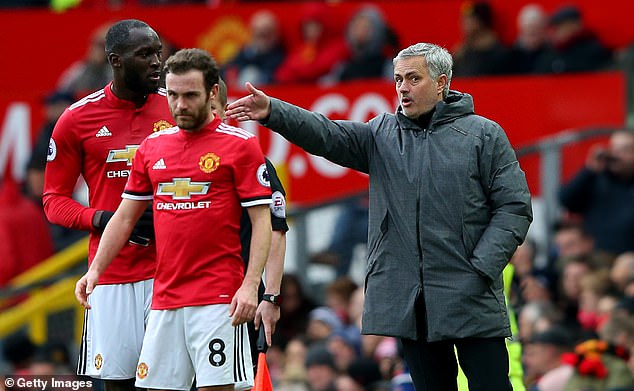
Some of the gaps between Liverpool and United in the league over the last ten years have been terrifying from the latter’s point of view.
It was 31 points in 2019 and 33 a year later. In 2022 it was 34 and in 2024 stood at 22. United did squeeze ahead in 2018, 2021 and 2023 but last year modern order was restored.
As Liverpool took the title with 84 points, United – marooned in 15th place – had exactly half that amount.
For all that their performances have fallen off a cliff in recent years, United remain a phenomenally powerful and commercially successful football club.
Their revenues for the year 2023-24 were a club record of Euros €770.6m (£669.1m) which placed them fourth in the Deloitte Money League of European clubs (behind Real Madrid, Barcelona and Manchester City) and four places ahead of Liverpool who reported a figure of €714.7m (£620.6m).
United have just revealed that they marginally topped that figure in 2024-25 and that was despite a lack of Champions League football. Both clubs have kit deals with Adidas, United’s coming in at £90m a season and Liverpool’s thought to be around the £60m a year mark. In terms of shirt sponsorship, United’s arrangement with Snapdragon nets them around £55m a year while Liverpool’s with Standard Charter is worth about £5m a year less. It is, though, up for renewal in less than two years.
Liverpool have taken huge steps forward in recent seasons as regular European football and the expansion of their Anfield stadium have had an impact. They lost an incredible amount of financial ground as United eased away from them on the back of smart commercial thinking around the turn of the millennium and though they are back in the game the potential for United remains huge if they can only get things right on the pitch. Coach Amorim has to get United back in to the expanded Champions League if he is to survive and if United are not to stagnate further.
Equally, the potential of new Old Trafford – still at the planning stage – cannot be overstated. United’s stadium has 13,000 more seats than Anfield but only the latter will be used as a venue for the 2028 European Championships. Real’s match day revenues have doubled now that the revamped Bernabeu is open so while Liverpool may be on the way to maxing out their commercial potential, United still have headroom.
Old Trafford is in need of a refurbishment to bring them in line with giants like Real Madrid (pictured - a conceptual image of the potential new Old Trafford under plans revealed last year)
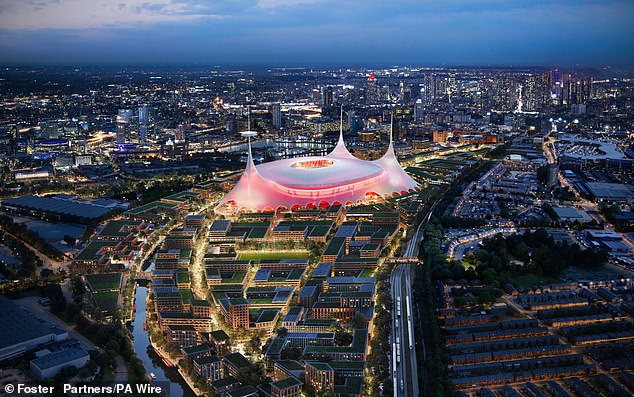
‘They need to start winning trophies,’ said football finance expert Kieran Maguire. ‘The Champions League is worth at least £70m or £80m, maybe double if you do well. And when you win everything sponsors want to be associated with you.’ This is born out by anecdotal evidence. Sources at City, for example, now report that when they seek commercial deals the most dangerous rival party tends not to be United – as was traditionally the case – but Liverpool.
‘United can no longer trade on the brilliance of the past,’ added Maguire. ‘They can put up prices at games and they have. Turfing out the old boys and girls from behind the dugout is an option. But new stadiums make a difference. They need to build one.’
In terms of fanbase and interest and reach across England, Europe and the world, these two great clubs sit way out in front. It is acknowledged now at FIFA that one of the reasons the TV rights for last summer’s Club World Cup were slow to sell was because Liverpool, United and indeed Barcelona were not in it. Which of the two English clubs has their nose ahead is almost impossible to tell. Sunday’s game will be broadcast on Sky and remains the station’s standout fixture of the season.
A source at Sky told the Daily Mail: ‘This is our Super Sunday to beat all Super Sundays and it always is.’ More than 3 million viewers are expected to turn on Sky’s coverage – a third more than the Brentford v Manchester City Super Sunday game from two weeks ago - while estimates around the world sit at about 600m – which makes it comfortably bigger than the Super Bowl.
Rebecca Lowe – the English face of NBC’s Premier League coverage in America – tells the Daily Mail: ‘Man United are still – alongside Liverpool – very much some way out in front over here. Their hold on the American public is still very strong even if there is a slight question about for how long. The United fans I meet and know all tend to pre-date me working out here. They are the dyed-in-the-wool fans. Expats or just fans who sought out the Premier League back in the day. United are safe here right now. United and Liverpool just had such a head start on the rest.’
At Sky, they report similar data. United still do more for their digital website numbers than anybody else but Liverpool are now very close behind, a new breed of fan coming hard on the back of what Klopp did for the club. Each club will spin it their way, of course. Liverpool’s website reported just over a year ago that they were the world’s most-watched Premier League club on TV ‘with a cumulative audience of 471 million for all 38 league games’. That research had been done by the Nielsen marketing and research company.
More tangible perhaps is the attitude of the traditional English broadcasters to United. Only once since 2005, for example, has a United game in the FA Cup not been shown live on TV. That’s a run of 96 consecutive games excluding United’s 2-0 win over Derby in 2018 which went unscreened.
Liverpool have reported that they are now the world's most watched Premier League team
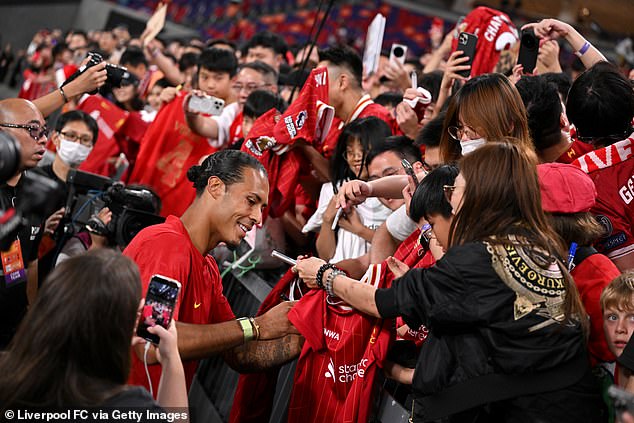
United’s enduring appeal to the new breed of football fan is clear. The content creator Mark Goldbridge, for example, has approaching 2m subscribers on his various social media channels, many of whom are happy merely to watch him react to camera on the ebb and flow of an average United game.
Widely available figures tell us that United lead the way in terms of followers on the mainstream channels such as X and Instagram with a combined number north of 200m. Liverpool come in around the 150m mark on a scale that is changing all the time but claim to have farmed more actual engagements than anybody else.
Another increasingly important factor when it comes to attracting new supporters is that young sports fans in 2025 are just as likely to follow individual players as teams, a consequence of the growth of platforms like YouTube and indeed the enduring popularity of video games such as EA Sports FC (formerly known as FIFA).
In September, EA released their list of 26 highest rated men’s players in Europe. Liverpool had five players – Mo Salah, Virgil van Dijk, Alisson Becker, Florian Wirtz and Alexander Isak - on the list while United had none. This threatens their popularity.
Michael Tiron of the USA-based Footy Travelers podcast told the Daily Mail: ‘Around the world now kids follow the player as a brand. He has his own ID outside of his team. United have not had a signature player for ages. It’s Mbappe or Salah or Bellingham. You could mention Bruno Fernandes but he isn’t really seen that way. And in America, short-term memory can sometimes be more important than history or legacy. People follow winners here. In the post-Ferguson era people have become so disillusioned because the club is not living up to its past. People don’t always want to be seen in that shirt now…’
Bruno Fernandes is a talismanic figure but his star power has not crossed over like Mo Salah
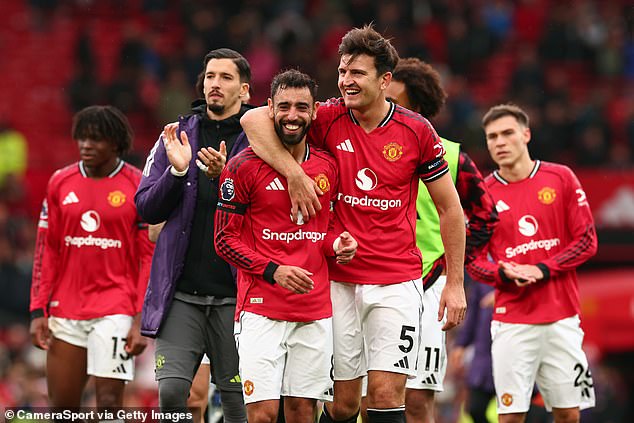
When United were having some renovations done to their training ground 15 years ago, Ferguson found himself using a Portakabin as an office. He liked it. ‘I leave the door open which means that people walk past and I can see them,’ he recalled. ‘But too many of these builders are Scousers. They will be taking my secrets back to Anfield!’
Ferguson was only half joking. The great Scot’s personal history with Anfield started when he went to see Liverpool beat St Etienne in an epic European Cup quarter-final in 1977. ‘I didn’t walk away from that game,’ he said later. ‘I floated out. It was as if I had been given an injection of stimulant drugs’.
He was to suffer there with Aberdeen three years later, his team coming away with a 4-0 hiding in the same competition, and his understanding of the United-Liverpool rivalry was soon to form.
‘It’s always been our main derby,’ Ferguson said. ‘Geographically, historically, the two cities. The two most successful clubs in Britain. You always expect sparks to fly.’
Ferguson knocked Liverpool off their perch, of course, but it has not transpired to be a permanent shift. Anfield at 4.30pm on Sunday is the place to be this weekend. Familiar territory and just three points on offer. But much more to be won and lost and claimed besides.